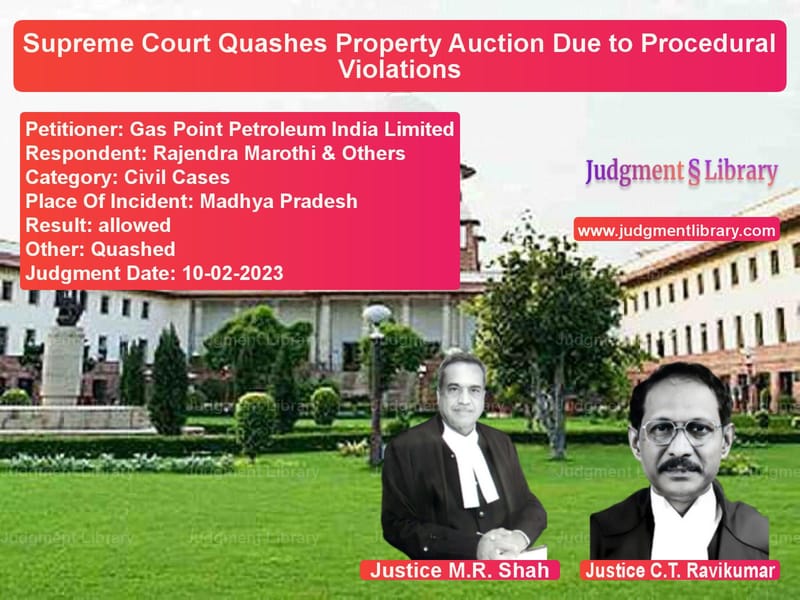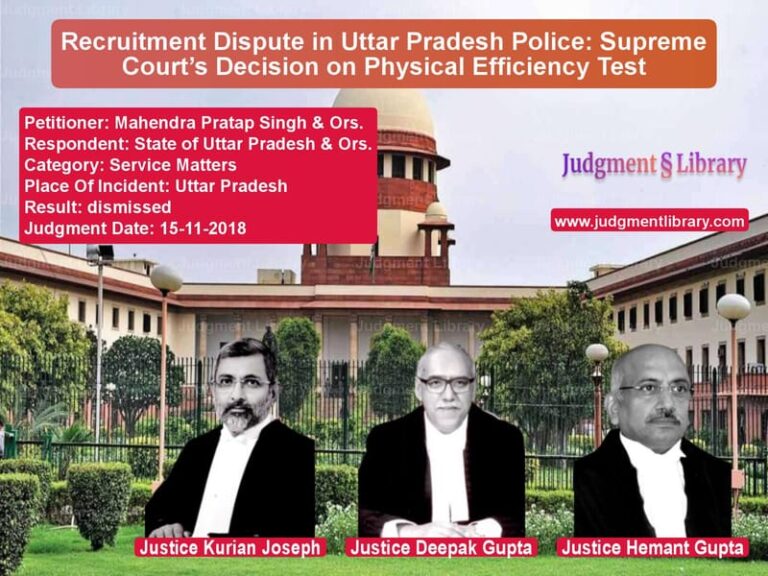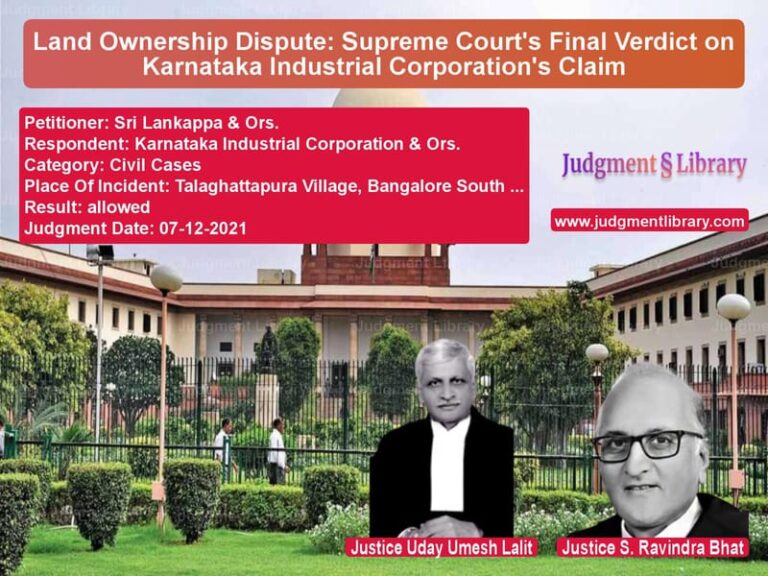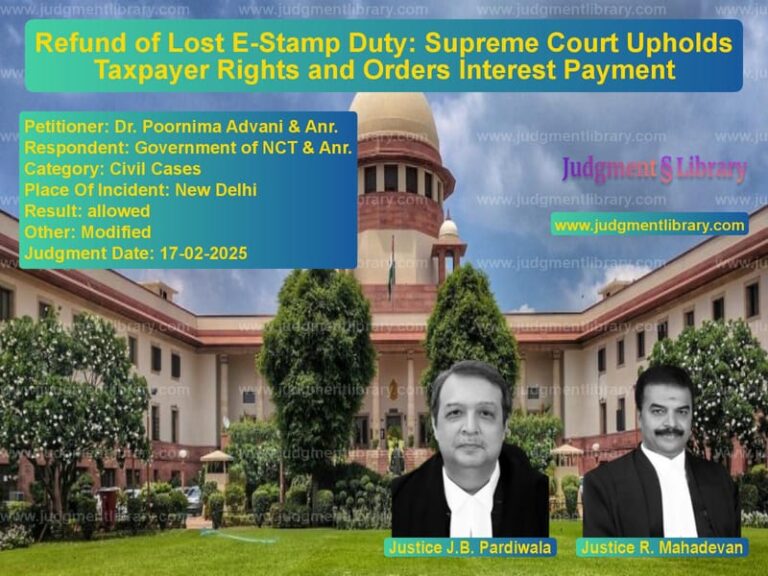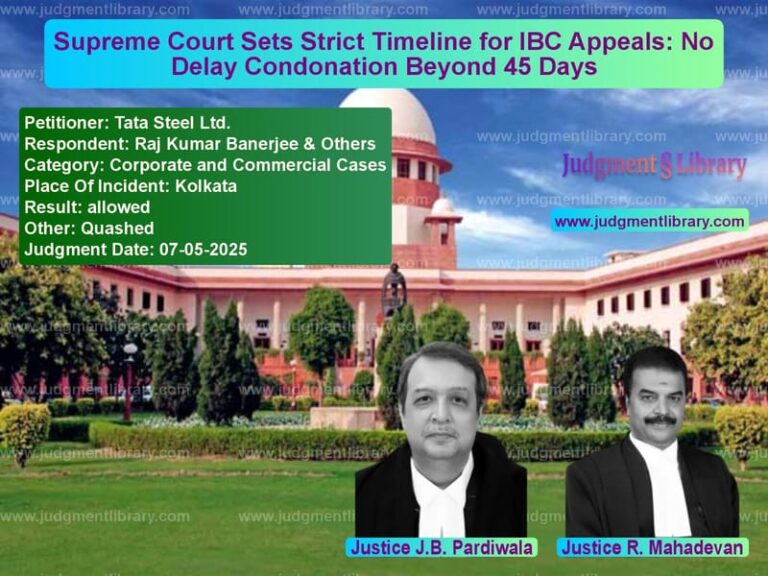Supreme Court Quashes Property Auction Due to Procedural Violations
The Supreme Court of India, in its judgment dated February 10, 2023, ruled on a significant case concerning the auction of property in an execution proceeding. The case, Gas Point Petroleum India Limited vs. Rajendra Marothi & Others, addressed the legality of a property auction conducted in violation of procedural norms under Order 21 Rules 64, 84, and 85 of the Code of Civil Procedure (CPC). The Court set aside the auction, restoring the appellant’s ownership rights.
Background of the Case
The case arose from a property dispute involving an LPG gas agency agreement. National Ginni Enterprises was in dispute with Smt. Gayatri Agrawal over the agreement, leading to Civil Suit No. 07-A/98. The trial court ruled in favor of Agrawal, directing the judgment debtor to supply LPG gas as per the agreement. In case of failure, the decree specified an alternative compensation of Rs. 2,38,450 + Rs. 23,500.
Since the judgment debtor failed to comply, an execution petition was filed, leading to the auction of the property on October 18, 2011. The auction was conducted to recover the decree amount, and the property was sold to Rajendra Marothi. However, Gas Point Petroleum India Limited, which had purchased the property from the judgment debtor in 1999, challenged the auction.
Arguments by the Appellant (Gas Point Petroleum India Limited)
- The property auction was invalid as it violated Order 21 Rules 64, 84, and 85 of the CPC.
- Under Rule 84, the auction purchaser must deposit 25% of the sale amount immediately after being declared the highest bidder. However, the deposit was made on November 3, 2011, violating the requirement.
- Rule 85 requires the balance 75% payment within 15 days, but the purchaser deposited the amount only on November 4, 2011, beyond the prescribed period.
- The property was already purchased by the appellant in 1999 through a registered sale deed, much before the auction.
- Since the judgment debtor was no longer the owner at the time of the auction, the property should not have been sold.
Arguments by the Respondents (Auction Purchaser and Judgment Debtor)
- The auction was conducted legally under the execution process.
- The auction purchaser had complied with the payment requirements, albeit with minor delays.
- The trial court had issued an injunction in 1999, restricting the transfer of the property, making the appellant’s 1999 purchase questionable.
- The appellant had no right to challenge the auction as they were not a party to the original litigation.
Supreme Court’s Observations and Judgment
The Supreme Court ruled in favor of the appellant, stating:
“The provisions regarding the deposit of 25% of the purchase money immediately and the full amount within fifteen days are mandatory. Any violation renders the sale a nullity.”
The Court relied on precedents, including Manilal Mohanlal Shah vs. Sayed Ahmed (1955) 1 SCR 108, which held that failure to comply with these rules makes the sale non-existent in law.
The Court observed:
“The defaulting purchaser forfeits all claim to the property. The obligation to resell the property is imperative, and the failure to adhere to these norms vitiates the entire auction process.”
Key Takeaways from the Judgment
- Auction procedures are strictly regulated: Non-compliance with CPC rules invalidates the sale.
- Property rights of prior purchasers are protected: If a property is already sold, it cannot be re-auctioned under an execution proceeding.
- Payment deadlines must be followed: Any deviation in deposit timelines makes the auction null and void.
Implications of the Judgment
The ruling ensures that auction procedures adhere to legal norms and protects property owners from wrongful dispossession. It also serves as a caution to authorities conducting judicial sales, emphasizing strict adherence to the CPC.
Conclusion
The Supreme Court’s decision upholds the integrity of auction procedures and protects lawful property transactions. By setting aside the auction, the ruling reinforces the importance of following due process in judicial sales, ensuring fairness for all parties involved.
Petitioner Name: Gas Point Petroleum India Limited.Respondent Name: Rajendra Marothi & Others.Judgment By: Justice M.R. Shah, Justice C.T. Ravikumar.Place Of Incident: Madhya Pradesh.Judgment Date: 10-02-2023.
Don’t miss out on the full details! Download the complete judgment in PDF format below and gain valuable insights instantly!
Download Judgment: gas-point-petroleum-vs-rajendra-marothi-&-o-supreme-court-of-india-judgment-dated-10-02-2023.pdf
Directly Download Judgment: Directly download this Judgment
See all petitions in Property Disputes
See all petitions in Damages and Compensation
See all petitions in Judgment by Mukeshkumar Rasikbhai Shah
See all petitions in Judgment by C.T. Ravikumar
See all petitions in allowed
See all petitions in Quashed
See all petitions in supreme court of India judgments February 2023
See all petitions in 2023 judgments
See all posts in Civil Cases Category
See all allowed petitions in Civil Cases Category
See all Dismissed petitions in Civil Cases Category
See all partially allowed petitions in Civil Cases Category

